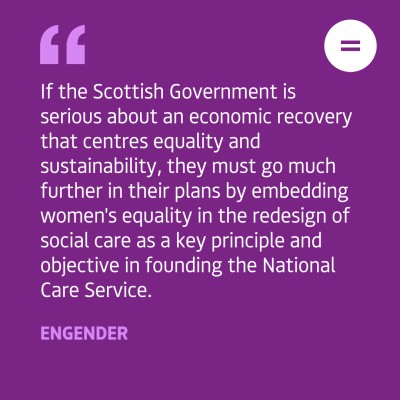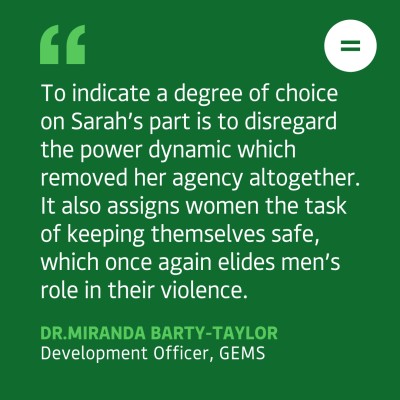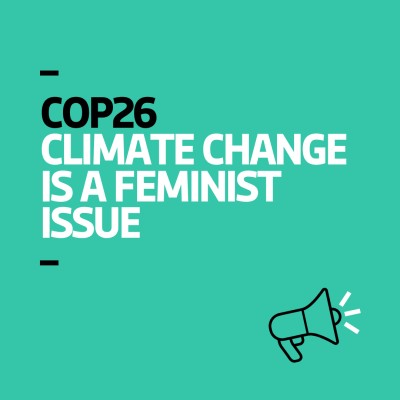Engender blog
All of Engender’s latest news. Reports, reviews, books, articles, and information from across Scotland’s women’s sector.
We would love to hear from other feminists around Scotland. Check out our guidelines for more information on how you can blog for us.
Recruiting for Engender's Executive Director
Today we have launched the recruitment to find Engender’s new Executive Director.
The Executive Director is the most senior role at Engender and represents the organisation with dynamism and a high degree of professionalism. They are a passionate advocate for women's rights and equality in Scotland and beyond as part of a global intersectional feminist movement.
The Executive Director has overall responsibility for Engender’s strategic direction and policy development, working closely with the Board and staff team, providing leadership, vision, and sound financial management. They are an ambassador for Engender and ensure a high public profile for the organisation externally, building and maintaining excellent relationships with a wide range of stakeholders and driving the development of programmes and fundraising.
All of the details about the role of Executive Director and how to apply can be found here.
The Engender board have been working with an external recruitment consultant to ensure that we are doing all we can to find the right fit for Engender, and running a process which is feminist, flexible, transparent, and reflects the competing pressures on women’s lives. We actively welcome applications for part-time, job-share or other flexible working arrangements.
While the loss of Emma will always be felt, we are hopeful that we will find the right person or people to guide Engender through the next phase of our work for intersectional feminist policy making in Scotland. In the meantime, our managerial team of Catriona Kirkpatrick, Eilidh Dickson, Jill Wood and Alys Mumford are continuing to take on additional duties as our Interim Leadership Team. You can find individual contact details for them here https://www.engender.org.uk/content/staff/, or continue to get in touch via info@engender.org.uk.
Where are the women in Scottish Government plans for a National Care Service?

Care is one of the key areas of women’s inequality in Scotland, with women representing the majority of service users, the vast majority of the social care workforce, and the majority of unpaid carers. Care continues to be undervalued and underpaid, precisely because of its long association with ‘women’s work’ and outdated gender norms.
Yet the Scottish Government’s Consultation on a proposed National Care Service for Scotland seems to completely ignore this fact, failing completely to consider gender in their proposals. Equality is not embedded in their plans, and the consultation document does not take into account women’s lives and experiences. The Government has not even published an equality impact assessment as part of the consultation, which would have highlighted the disproportionate impact that failures in social care have on women. In order to be effective, impact assessments should be done as early as possible to actually inform the development of policy.
Climate Change is a Feminist Issue
Over the next two weeks COP26 is taking place in Glasgow, where governments will negotiate actions and rules for addressing climate change.
We all know that climate change is a feminist issue, particularly because the effects are already being felt disproportionately by women and communities of colour across the world. If you want to find out more, Gal-dem’s new series ‘It’s Happening Now’, explores the effect of the climate crisis and campaigns for change to address its effects on marginalised communities in the UK and around the world. They are publishing a series of articles during, and beyond, COP26 which you can access here.
When Words Fail: The Way Institutions Talk about Sarah Everard Matters
[CN: violence against women, police violence]
In this blog post, Gender Equal Media Scotland's Development Officer, Dr. Miranda Barty-Taylor, discusses the language used by institutions in the wake of the Sarah Everard case and trial, and the epidemic of violence against women and girls in the UK. This blog entry largely refers to UK institutions.

I am grappling with my unproductivity, as my concentration veers from a report on gender equality in the media to the horrifying details emerging from the trial of Sarah Everard’s killer. I suppose it is little wonder; while half my brain analyses the discourses being reproduced in the inevitable public discussion of the trial, the other half is reeling from the fear she must have felt. Just as I deconstruct the ideologies behind the Met’s next statement, I feel again an incandescence of anger that is too bright to bear. The language coming from sites of political and police power is so very problematic, reinforcing misogynistic norms and neglecting to acknowledge the crisis of men’s violence against women.
CEDAW: how are the UK and Scottish Governments responding to the recommendations?
-400.png)
During the 8th periodic review of the UK from the Committee of the Convention on the Elimination of All Forms of Discrimination Against Women, the UN Bill of Rights for women, several recommendations were made to the UK Government to improve women's equality and rights (find out more about the CEDAW process here).
These recommendations included three specific areas that the UK is meant to feedback their progress on – incorporation of CEDAW, the impacts of Brexit, and an oversight mechanism for women’s participation in CEDAW at UK level. The UK Government has submitted its progress report on these areas, but it didn’t consult with any of the organisations who have been involved with the CEDAW process at UK level (Engender, the Women's Resource Centre, the Northern Ireland Women’s European Platform, and Women’s Equality Network Wales), and it’s fair to say they were wearing their rose-tinted glasses while writing their report.
Downloads
 Engender Briefing: Pension Credit Entitlement Changes
From 15 May 2019, new changes will be introduced which will require couples where one partner has reached state pension age and one has not (‘mixed age couples’) to claim universal credit (UC) instead of Pension Credit.
Engender Briefing: Pension Credit Entitlement Changes
From 15 May 2019, new changes will be introduced which will require couples where one partner has reached state pension age and one has not (‘mixed age couples’) to claim universal credit (UC) instead of Pension Credit.
 Engender Parliamentary Briefing: Condemnation of Misogyny, Racism, Harassment and Sexism
Engender welcomes this Scottish Parliament Debate on Condemnation of Misogyny, Racism, Harassment and Sexism and the opportunity to raise awareness of the ways in which women in Scotland’s inequality contributes to gender-based violence.
Engender Parliamentary Briefing: Condemnation of Misogyny, Racism, Harassment and Sexism
Engender welcomes this Scottish Parliament Debate on Condemnation of Misogyny, Racism, Harassment and Sexism and the opportunity to raise awareness of the ways in which women in Scotland’s inequality contributes to gender-based violence.
 Gender Matters in Social Security: Individual Payments of Universal Credit
A paper calling on the Scottish Government to automatically split payments of Universal Credit between couples, once this power is devolved to the Scottish Parliament.
Gender Matters in Social Security: Individual Payments of Universal Credit
A paper calling on the Scottish Government to automatically split payments of Universal Credit between couples, once this power is devolved to the Scottish Parliament.
 Gender Matters Manifesto: Twenty for 2016
This manifesto sets out measures that, with political will, can be taken over the next parliamentary term in pursuit of these goals.
Gender Matters Manifesto: Twenty for 2016
This manifesto sets out measures that, with political will, can be taken over the next parliamentary term in pursuit of these goals.
 Scottish NGO Briefing for UN Special Rapporteur on Violence Against Women
Joint briefing paper for the UN Rapporteur on Violence Against Women.
Scottish NGO Briefing for UN Special Rapporteur on Violence Against Women
Joint briefing paper for the UN Rapporteur on Violence Against Women.

Newsletter
Sign up to receive our newsletter here:
Sign up to our mailing list
Receive key feminist updates direct to your inbox:
